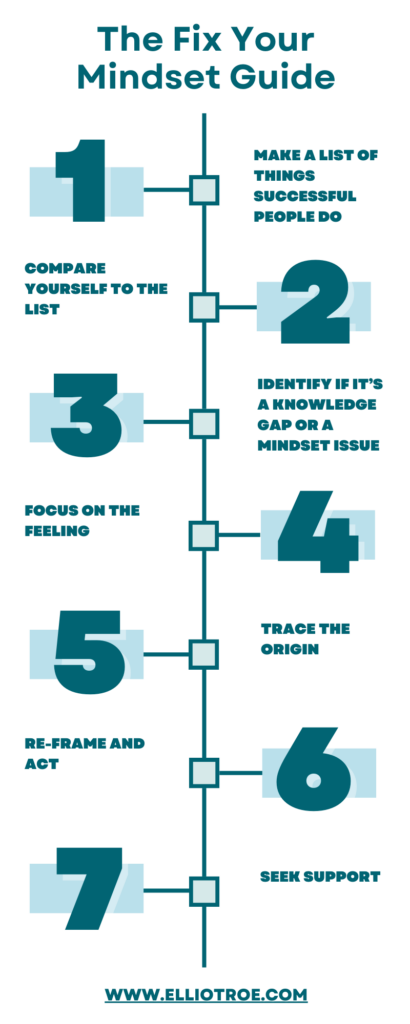
What You'll Learn...
- Why procrastination is more than just laziness…it’s an identity protection issue
- The top three common issues founders face when trying to grow their business
- When an issue is a business issue or a mindset issue
- Practical steps to identify and overcome mindset issues blocking your success
- The same process I use with the top poker players and founders in the world.
Why do we procrastinate?
Anybody here procrastinate?
The “power of later” is a beautiful feeling–and a vicious habit to break.
The obvious question most people have when confronting procrastination is: how do I stop? What exercises should I be doing to break the pattern of destruction?
But the real question is: What is it about procrastination that feels so good and keeps us from fulfilling our potential?
Here’s what I’ve found about procrastination: It creates a wonderful protection for your ego. And that need for protection generally starts being programmed into your brain at an early age.
As a mindset coach, I’ve had the privilege of assisting elite performers, from professional athletes to CEOs, in breaking through the mental barriers that cap their potential. These individuals come to me at a plateau, sensing they can achieve more but finding themselves inexplicably stuck.
Here are a couple of places where founders tend to procrastinate:
- Keeping on members of staff longer than they should be because they’re too scared to fire them or have the difficult conversations.
- Asking for money. For many CEOs, asking for investment dollars can be terrifying, so it’s pushed off until it’s almost too late. And unfortunately, if you wait until crisis, you usually get a worse deal.
- Investing in Personal Development. Founders often recognize the need to enhance their skills or knowledge to better lead their companies but put off this personal development for “when there’s more time.” By not investing in themselves, they limit their ability to inspire, innovate, and lead effectively.
Why do we procrastinate stuff like this?
Because it makes us feel uncomfortable. Maybe emotionally uncomfortable. Maybe sick to our stomachs…pressure on our chests…blinding, paralyzing headaches.
For many, these are feelings that need to be avoided, to run away from.
As a mindset coach, I’ve had the privilege of assisting elite performers, from professional athletes to CEOs, in breaking through the mental barriers that cap their potential. These individuals come to me at a plateau, sensing they can achieve more but finding themselves inexplicably stuck.
It’s not merely about the fear of not succeeding in the task itself but a deeper, more existential fear of what that failure represents. If they were to give their all and still fall short, it could fundamentally challenge their perception of themselves as intelligent or capable individuals.
The “Too Smart To Try” mindset
In many of my sessions with top performers and founders, I’ve found a few “programs” that people have deep in their brains. Many don’t even realize it’s there. An example is the “Too Smart to Try” program.
This mindset emerges from an early age, where praise is often linked to one’s natural intelligence rather than the effort expended.
For example, I had a client, let’s call him John, who was always praised for being clever as a child. He’d raise his hand, get the right answer, and feel great about himself.
They’d get A’s in elementary school, and everyone tells them how clever they are.
At some stage, it becomes scary to study because if they study for a test and they fail, they lose their identity.
If they don’t study and fail, nothing’s lost because they can say I’m lazy, I didn’t study, but if I’d tried, I would have succeeded.
So they create this program of ego protection through childhood, which often then follows them through life, and they choose to not give 100% because they’re scared of losing their identity if they actually fail. It would mean something if they’re tried, but if they don’t try, they don’t have to actually fail.
This can massively reduce their chances of success.
Exploring this further, I found that this “program” can manifest as procrastination or avoiding tasks that present a real challenge to them.
It’s not merely about the fear of not succeeding in the task itself but a deeper, more existential fear of what that failure represents. If they were to give their all and still fall short, it could fundamentally challenge their perception of themselves as intelligent or capable individuals.
Therefore, they hold back, leaving room for the excuse that it wasn’t an actual test of their abilities, protecting their ego at the expense of their growth. While serving as an emotional safeguard, this mindset significantly limits their potential and ability to pursue opportunities beyond their comfort zone.
The “Hiding Your Shine” mindset
So I had a client who was holding themselves back in their career for some reason, and it was clear they weren’t living up to their full potential.
I wasn’t sure why it was happening, why they weren’t performing at their best.
We went into a hypnotherapy session on this, and it brought up some memories of being bullied at school. Specifically, he would get bullied when he put his hand up and answered the questions correctly.
The way he responded to this bullying was to dumb himself down at school. Because dumbing himself down and not answering the questions kept him safe from bullying.
So we called this the “hiding your shine” program. This program continued throughout his life; he felt like attention equaled danger. We worked through the issue, and he understood that he’s now safe.
When you work through programs like these, you can reach your full level of performance, like in the case of this client, where he won over 16 million dollars in poker the next year.
The Guide to Fixing Your Mindset
Most people who come to me are elite performers in their field. Poker players, UFC champions, Olympic athletes, CEOs.
No one would label these people as “soft” or “weak-willed.”
But just because they’re strong, it doesn’t mean they can unlock their full potential alone. Sometimes, a mindset change is the final step to winning whatever game they’re playing.
Here is one of my favorite methods you can use to identify mindset issues:

Step 1: Make a list of things successful people do
First, write down what you believe the leader in your industry is doing that makes them successful.
- What does their business look like?
- How do they manage their time?
- How do they manage their staff?
- How do they manage their finances?
- What else do they do well?
Step 2: Compare yourself to the list
Look at your list and underline the ones you’re doing well at. Well done! Pat yourself on the back.
Now, the hard part, circle the ones that make you the most uncomfortable.
Step 3: Identify if it’s a knowledge gap or a mindset issue
For each circled item, ask yourself if you know how to do it.
Here’s what I tell my clients: “If you don’t know what to do, you need a consultant or a business coach. If you know what to do but can’t bring yourself to do it, you need a mindset coach.”
If you know how to do the circled item and you know you need to do the circled item, it’s generally a mindset issue.
Just knowing you have an issue is the first step towards overcoming it.
Step 4: Focus on the feeling
When you’ve identified a task that triggers procrastination, pay attention to how it makes you feel. Is there physical discomfort? A tightness in your chest, a knot in your stomach? These sensations are your body’s way of signaling deeper emotional resistance. Acknowledge these feelings without judgment, understanding they are a part of your programmed response.
Step 5: Trace the origin
Once you know the physical manifestations of your procrastination, trace these feelings back to their origins. Ask yourself, “When have I felt this way before?”
You’ll often find these sensations tied to past experiences that have nothing to do with the task at hand.
Recognizing this can help diminish the power these feelings have over your actions.
Step 6: Re-frame and act
With this newfound awareness, start to re-frame how you view the task.
Instead of seeing it as a potential failure point, view it as an opportunity to learn, grow, or simply move forward.
Then, take action, however small.
Action breeds confidence and dilutes the paralyzing effect of fear. It’s about building a new program within yourself that values progress over perfection.
Step 7: Seek support
Sometimes, the journey to overcoming deep-seated mindset issues can feel overwhelming. This is where seeking support, be it from a mindset coach, a mentor, or a supportive community, becomes invaluable.
Sharing your struggles, getting external perspectives, and hearing how others have navigated similar challenges can provide the encouragement and insight needed to break through your own barriers.
If you don’t know what to do, you need a consultant or a business coach. If you know what to do but can’t bring yourself to do it, you need a mindset coach
Overcoming your learned programs
It’s important to remember your programs are not innately who you are. Therefore, you can unlearn them. Just knowing there’s a space to unlearn them will allow you to start making some changes.
-
Elliot Roe is a leading expert in Mindset Optimization for High Performers and is the world’s #1 Mindset Coach for poker players. His poker clients have won over $100,000,000 and nearly every major tournament title, including the World Series of Poker Main Event. Elliot’s clientele also includes Olympic medalists, UFC Champions, Hollywood Actors, Business executives and wall street traders. His unique mindset coaching system leverages the power of hypnotherapy to eliminate fears and breakthrough mental roadblocks allowing you to operate in a state of peak performance every day.
View all posts






